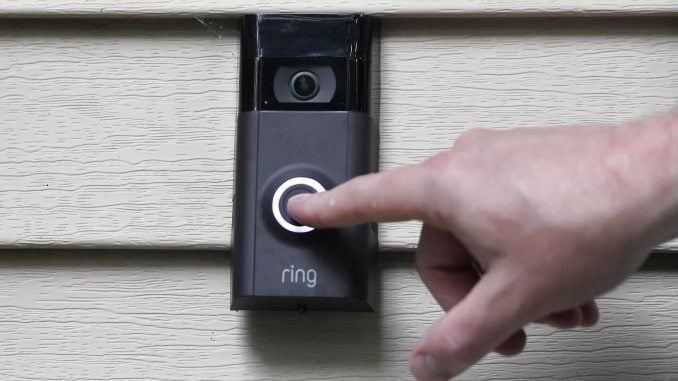
RALEIGH — The increase in popularity of doorbell cameras has led to an increase in privacy concerns and for citizens to know their rights when it comes to surveillance technology.
The top doorbell camera systems being used right now are Amazon’s Ring and Google’s Nest. Both offer software that allows owners to monitor their homes and locations of the cameras, but privacy advocates have raised concerns neighborhoods are becoming surveillance heavy, that the footage isn’t always what it seems, and minorities might be targeted more heavily than others.
That neighbor next door or even halfway down the street could be watching you, your house or the whole block.
The cameras in doorbell systems are often such a high-resolution that they can capture images of homes across the street and even down the block in startling detail. While designed for a doorway or porch area, homeowners have installed cameras on decks, roofs, driveways and patios.
Amazon was recently criticized for filing a patent to put its controversial “Rekognition” facial-identification software into Ring doorbells with the express purpose of automatically flagging “suspicious” people. Critics charge the Amazon facial-id software is unreliable, prone to misidentification and has potential for abuse.
Homeowners are not the only ones interested in what these doorbell systems are capturing. Law enforcement agencies around the country have begun working directly with Google and Amazon and other camera manufacturers.
Amazon’s Ring comes with an app called Neighbors which law enforcement agencies can join and view publicly uploaded videos. Neighbors is a free app that anyone can use — even if they don’t own a doorbell camera. The app allows police to request additional data from Ring for areas “where an incident may have occurred.”
Both Google and Amazon have stated they require warrants before granting access to any footage they have stored. Private property owners do not have to share their footage, but thousands do, and the ease of access by law enforcement to publicly shared footage has raised other privacy and legal concerns.
Recently, it was discovered that Ring has been working behind the scenes on doorbell camera partnerships with over 400 police forces across the country. Amazon has dubbed these partnerships with police the “new neighborhood watch.”
These partnerships grant law enforcement automatic request ability for video from any Ring device in a specific area and during a specific time. Ring customers can decline the request for their footage, but any posted publicly are fair game and Ring has admitted that footage deleted by a user or subscriber can be saved to fulfill legal obligations.
In Amazon Ring’s terms of service, video will be given to “law enforcement authorities, government officials and/or third parties” if the company thinks it is needed to comply with a legal request.
Partnerships are one way that police are getting video access. Another way is the creation of voluntary camera registries which are popping up in cities and towns nationwide. These registries have been criticized as a way for police to get around having to get a warrant as they usually would for such footage.
Beyond registries, police in Washington, D.C. have a program that pays homeowners or property owners up to $500 for access to their private cameras. The City of Hammond in Indiana is using matching funds from Ring to give $125 discounts for up to 500 city residents to purchase certain Ring devices.
The Fayetteville Police Department is partnering with Amazon and will be using its Neighbors app.
“Five thousand ring users in the city of Fayetteville and that’s was really impressive about this because we get 5,000 cameras,” Fayetteville Police’s Major Nolette told WTVD in June of this year.
Surveillance footage has also made its way to the Charlotte Police Department in at least two cases, where cameras caught attempted home invasions on camera.
Since doorbell cameras, their associated apps and police programs are fairly young, there are very few statistics for effectiveness or number of arrests when doorbell camera footage is involved, however, sometimes an arrest is made.
That was the case in July in Raleigh when the Wake County Sheriff was able to track down a Peeping Tom after a North Raleigh neighborhood posted home surveillance footage of the perpetrator.
While the Wake County Sheriff’s office said that they do not have any agreements with local neighborhoods who use apps like Ring and Nextdoor, Wake Sheriff spokesman Eric Curry said they would not rule out entering into such partnerships in the future.
Before purchasing a system, it’s important to know the rules for recordings in one’s state, whether it be audio, video or both. The North Carolina Electronic Surveillance Act says that only one party needs to give consent to record and that a person can record through the doorbell camera in the state without the consent of anyone who may appear on the camera.
If the camera system has audio, one person must consent to that recording and it is permissible for a person to share such a recording. When in doubt, some homeowners have resorted to placing warning signs about surveillance cameras on their property, but most do not.
Amazon’s Ring can cost anywhere from $99 for the base model to $250 for its Doorbell Pro model. Google’s Nest Cameras typically cost between $199 and $349 and require subscription recording plans ranging from $5 a month to $30 a month.


